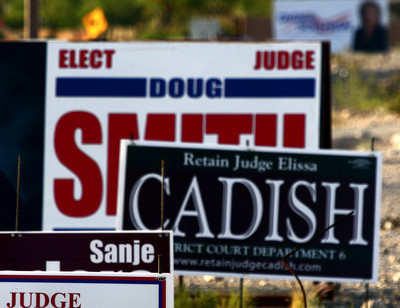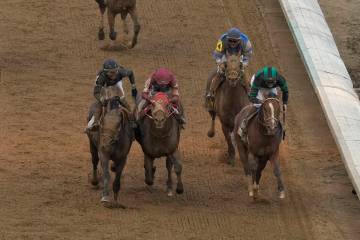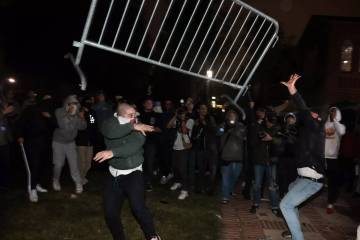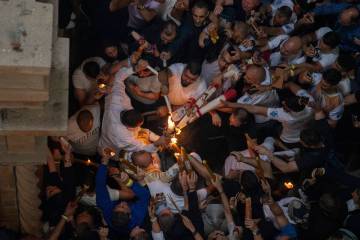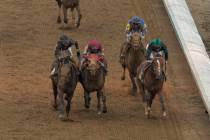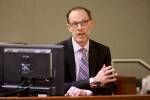Lawyers support appointing judges
By a 2-1 ratio, local lawyers favor dumping the election of state judges for a system that appoints judges, according to the Review-Journal's 2008 Judicial Performance Survey.
That's the upshot of one survey question that didn't focus on the foibles of individual judges, but on the limitations of the process by which Nevada culls those who sit in judgment of the rest of us. The survey, done every other year, asks lawyers active in Clark County to anonymously rate judges who work within the county -- on city, justice of the peace or state district court benches -- as well as justices of the Nevada Supreme Court.
Former Gov. Kenny Guinn, not himself a lawyer, said the result of the question was not startling because he also is inclined toward switching to an appointment method, which would involve extensive vetting of candidates to select finalists. He describes Nevada's system of picking judges as "someone saying, 'I've been a lawyer for a long time, I'm going to run for judge.' "
"Rule by attorneys" is what some critics have disparagingly called the option of letting a committee or a government executive appoint judges.
But, appointment advocates volley back that it's the election method that has delivered the present crew of judges in Clark County, some of whom have distinguished themselves negatively in recent years. Judges' actions include taking campaign donations from parties who will appear in court within days before the selfsame judge; getting sued by a clerk for sexual overtures; and being suspended pending resolution of accusations of tainting juries and misusing judicial authority.
Both extremes came out in written comments by the lawyers who joined the survey.
"The system we have in place is the best. It allows the citizens of Clark County the opportunity to get rid of judges in elections, as they have clearly done in the past," one pro-elections attorney wrote. Even in an appointment system, the writer added, "All judges will do what they must to be retained, and the committee to appoint the judges will be subject to payoffs."
For the opposing view, another respondent wrote, "Having the judges raise money to run for election impairs the quality of justice in Nevada. ... Judges should be selected based on merit, not based on their ability to raise money or their desire to hold office."
A trend appeared among the 796 lawyers who answered the survey question about electing versus appointing judges. Namely, the longer an attorney has practiced law in Nevada, the less eager the attorney is to move from electing to appointing.
Almost 67 percent of total respondents favored appointment. But in the group of attorneys who are newest to Nevada -- having practiced here five years or less - 72 percent prefer appointing. From there, support for appointing eroded as attorneys gained more Nevada experience. Among attorneys who have practiced here more than 20 years, 61 percent, notably less than among newbies, prefer electing judges.
Does the Judicial Performance Survey suggest that young bloods, fairly fresh from law school, are simply steeped in the appointment propaganda purveyed by professional legal groups? The American Bar Association, the American Judicature Society and The Federalist Society have all come out in favor of merit selection of judges. Merit selection entails appointment, though the screening process and the party who appoints may vary.
And, does the recent survey mean that more old coots are content with electing judges because they know how to juice the system for their clients, either with longtime relationships or greater disposable income for campaign contributions?
Or, do they just doubt that an appointment system would remove politics, which is the owing of favors by bench-holders to the parties that put them in power?
The United States, too, is divided on the question of electing versus appointing judges. The federal justice system appoints judges for life, barring bad behavior, except in bankruptcy court, where it appoints for lengthy 14-year terms.
But the states have devised many ways to choose judges for their own courts. Nationally, 77 percent of trial judges must "stand for some form of contestable election," according to the National Center for State Courts.
Nine states elect candidates to certain courts, but appoint to others, according to the Institute for the Advancement of the American Legal System. Six states have partisan election of judges. Fifteen states, including Nevada, have non-partisan elections.
Fifteen states maintain commission-based appointments. Three states, California, Maine and New Jersey, let the governor appoint judges. Two, Virginia and South Carolina, let the legislature appoint. Of the states that appoint, three do lifetime appointment.
But when a Nevada district court develops a vacancy mid-term, then it switches from election to appointment, using a judicial selection commission to come up with candidates, from which the governor appoints one to serve until the winner in the next scheduled election for the post is sworn in. Guinn estimated that during his two administrations, he appointed 20 district judges or Supreme Court justices, for vacancies created by death, retirement, resignation or election to a different court.
For a state such as Nevada, which theoretically elects judges, Clark County has a lot who arrived on the bench by appointment. A "de facto" appointment system, created by practice, not the state constitution, already exists, some observers say.
In Clark County District Court today, 12 members have been appointed just since Guinn's first term as governor began in 1999. Data on earlier appointments of present incumbents was not available.
District court judges who start as appointees seem to do well in the eyes of attorneys who took the recent survey. Nine of the 12 most recent appointees landed in the survey's 25 top judges, as determined by overall retention rating. The survey covered 68 judges and justices in various courts.
The nine, in order from highest down, are David Barker, Allen Earl, Douglas Herndon, Arthur Ritchie Jr., Jennifer Togliatti, Timothy Williams, Elissa Cadish, Elizabeth Gonzalez and Michael Villani. The three district court appointees who did not make it into the top 25 were Kenneth Cory (rated 36th), Valorie Vega (53rd) and Michelle Leavitt (55th).
The state Legislature's next session will determine whether a pending proposal to switch to appointing judges advances. Called Senate Joint Resolution 2, the proposal needs to be passed once more by legislators in order to go to a general vote in 2010.
But Nevada voters have not looked kindly on giving up their right to pick judges, turning down similar ballot questions in 1972 and 1988. Tuan Samahon, on the UNLV law school faculty, wonders whether a future ballot would turn out differently, based on the recent influx of Democrat voter registrations in the state, as well as wave of negative publicity about Nevada judges, including a 2006 series in the Los Angeles Times.
"I can't say I read the public's mind," said state archivist Guy Rocha, "But what I do see, Nevadans generally want to make that decision themselves. They don't want to leave it to a governor or commission or someone else to do it for them."
Contact reporter Joan Whitely at jwhitely@reviewjournal.com or 702-383-0268.
Complete results including survey methology, summary of retention scores, questionnaire and more



